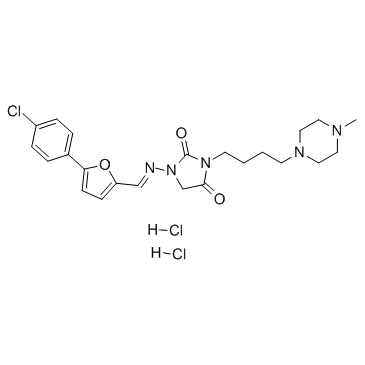盐酸阿齐利特

盐酸阿齐利特结构式

|
常用名 | 盐酸阿齐利特 | 英文名 | Azimilide (Dihydrochloride) |
|---|---|---|---|---|
| CAS号 | 149888-94-8 | 分子量 | 530.87500 | |
| 密度 | 1.32g/cm3 | 沸点 | 594.9ºC at 760mmHg | |
| 分子式 | C23H30Cl3N5O3 | 熔点 | N/A | |
| MSDS | 中文版 美版 | 闪点 | 313.6ºC | |
| 符号 |

GHS06 |
信号词 | Danger |
|
Azimilide dihydrochloride: a new class III anti-arrhythmic agent.
Expert Opin. Investig. Drugs 9(11) , 2705-15, (2000) Azimilide dihydrochloride (Stedicor) is a new class III anti-arrhythmic agent that is being developed by Proctor & Gamble to treat supraventricular and ventricular arrhythmias. Development of this agent is being undertaken due to the high prevalence of atrial... |
|
|
Electrophysiological and antiarrhythmic effects of the novel antiarrhythmic agent AZD7009: a comparison with azimilide and AVE0118 in the acutely dilated right atrium of the rabbit in vitro.
Europace 8(7) , 549-57, (2006) To compare the electrophysiological and antiarrhythmic effects of AZD7009, azimilide, and AVE0118 in the acutely dilated rabbit atria in vitro.In the isolated Langendorf-perfused rabbit heart, the atrial effective refractory period (AERP) and the inducibility... |
|
|
Azimilide for the treatment of atrial fibrillation, atrial flutter, and paroxysmal supraventricular tachycardia: results of a randomized trial and insights on the concordance of symptoms and recurrent arrhythmias.
J. Cardiovasc. Electrophysiol. 19(2) , 172-7, (2008) Azimilide hydrochloride is an investigational antiarrhythmic medication that had shown evidence of efficacy in prolonging the time to recurrence of atrial fibrillation (AF) or atrial flutter (AFL) and paroxysmal supraventricular tachycardia (PSVT). This study... |
|
|
Role of drug therapy for sustained ventricular tachyarrhythmias.
Cardiol. Clin. 26(3) , 405-18, vi, (2008) Antiarrhythmic drug therapy, broadly defined, is the mainstay of treatment and prevention of ventricular tachycardia (VT)/ventricular fibrillation (VF), which can lead to sudden death. This article evaluates the evidence for and appropriate use of class I ant... |
|
|
Effects of azimilide on the muscarinic acetylcholine receptor-operated K+ current and experimental atrial fibrillation in guinea-pig hearts.
J. Pharmacol. Sci. 105(3) , 229-39, (2007) Effects of azimilide, a class III antiarrhythmic drug, on the acetylcholine (ACh) receptor-operated K+ current (I K.ACh) and the delayed rectifier K+ current (IK) were examined in guinea-pig atrial cells using patch-clamp techniques. Effects of azimilide on e... |
|
|
Inhibitory effect of azimilide on Na+/Ca2+ exchange current in guinea-pig cardiac myocytes.
J. Pharmacol. Sci. 114(1) , 111-4, (2010) We examined the effect of azimilide, a class III antiarrhythmic drug, on Na(+)/Ca(2+) exchange current (I(NCX)) in guinea-pig cardiac single ventricular cells. External application of azimilide suppressed bi-directional I(NCX) in a concentration-dependent man... |
|
|
QT Interval prolongation and torsades de pointes due to a coadministration of ciprofloxacin and azimilide in a patient with implantable cardioverter-defibrillator.
Pacing Clin. Electrophysiol. 30(8) , 1043-6, (2007) The presented case report describes a male patient with an implanted cardioverter-defibrillator (ICD) in whom a coadministration of ciprofloxacin and azimilide caused QT interval prolongation and multiple episodes of torsades de pointes (TdP) followed by ICD ... |
|
|
Update on atrial fibrillation: part II.
Clin. Cardiol. 31(3) , 102-8, (2008) Antiarrhythmic drugs are an essential tool in the management of atrial fibrillation (AF). Although we are already on the threshold of a large expansion in the use of ablation therapies, these will not, however, be appropriate for all patients, and pharmacolog... |
|
|
The effect of high extracellular potassium on IKr inhibition by anti-arrhythmic agents.
Cardiology 108(1) , 18-27, (2007) Hyperkalemia is a potentially life-threatening disorder frequently occurring in hospitalized patients. The ischemic myocardium releases potassium into the extracellular space which can cause regional hyperkalemia. These changes may modify the effects of anti-... |
|
|
The impact of acute myocardial ischemia on the ventricular defibrillation threshold during chronic oral azimilide therapy.
J. Cardiovasc. Pharmacol. 50(6) , 629-32, (2007) The effects of chronic oral azimilide therapy on the ventricular defibrillation threshold (DFT) during ischemia are unknown. The effects of azimilide on defibrillation efficacy under ischemic condition were investigated in a closed-chest animal model. Azimili... |